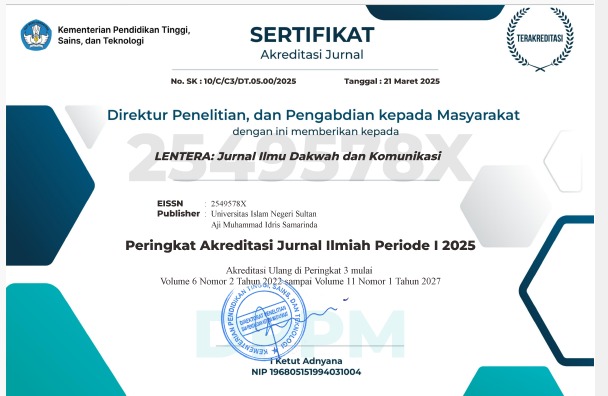JURNALISME ERA DIGITAL: DIGITALISASI JURNALISME DAN PROFESIONALITAS JURNALISME ONLINE
Abstract
Rapid technological progress, encourage journalism industry contributed penetrated on digitization, with the emergence of the phenomenon of online journalism. In the era of online journalism itself, journalists are required to follow the conditions of the readers in the virtual world, where information is required for fast-paced. But on the other hand, online journalists are also required to have more skills than conventional journalists, where the skills in providing both visual and writing content are also required to be faster and creative in innovating the appearance of news and information in writing in multiplatform. The journalistic skills required for this versatility create problems that arise, namely the professionalism of journalists themselves, in which the process of collecting news, processing, and presenting news is not in accordance with the ethics of professionalism of online journalists. This paper aims to find out how the problems and professionalism of online journalism. The positive impact of the professionalism of online journalism includes being required to be more skilled in the provision of both visual and writing content, as well as being required to be faster and creative in innovating the appearance of news and information. But in addition there are other problems, first about the collection of news that is vulnerable to plagiarism. Second, about news reporting, which shifts the practice of "pre-verification" to "post-verification", and third on the aspect of presenting the news, which gave birth to the title journalism phenomenon.
Keyword: Journalistic Digitalization, Convergence, New media, Online Journalism, Online Professionalism Journalism, Digital Communication
References
Asep S.M. Romli. Jurnalistik Online: Panduan Praktis Mengelola Media Online. Bandung: Nuansa Cendekia, 2012.
Aveseh Asough. “The Impact of Social Media on Journalism Ethics.” In Social Media and Ethics. Abuja: CIME, 2012.
Denis McQuail. Teori Komunikasi Massa. Jakarta: Erlangga, 2000.
Foust, James C. Online Journalism: Principles and Practices of News for the Web. 3rd ed. Scottsdale, Ariz: Holcomb Hathaway, Publishers, 2011.
Ignatius Haryanto. Jurnalisme Era Digital: Tantangan Industri Media Abad 21. Jakarta: Kompas Media Nusantara, 2014.
Jennifer Alejandro. “Journalism in the Age of Social Media.” In Reuters Institute Fellowship Paper. Oxford, UK: Reuters Institute for the Study of Journalism, 2010.
“Led by Facebook, Twitter, Global Time Spent on Social Media Sites up 82% Year over Year.” Accessed August 8, 2018. http://www.nielsen.com/us/en/insights/news/2010/led-by-facebook-twitter-global-time-spent-on-social-media-sites-up-82-year-over-year.
Yohanes Widodo. “Mojok.Co : Sedikit Nakal Banyak Akal.” Accessed August 9, 2018. http://newslab.uajy.ac.id/2017/12/07/mojok-co-sedikit-nakal-banyak-akal/.
Prilani. “Content Aggregator: Problem Etis Jurnalisme Online Di Indonesia.” Jurnal Nomosleca 3, no. 1 (2017).
Septiana Santana Kurnia. Jurnalisme Kontemporer. Jakarta: Yayasan Obor Indonesia, 2005.
Stanley J. Baran, and Dennis K. Davis. Teori Komunikasi Massa: Dasar Pergolakan Dan Masa Depan. 5th ed. Jakarta: Salemba Humanika, 2014.
Stephen W. Littlejohn, and Karen A. Foss. Theories of Human Communication. 9th ed. Jakarta: Salemba Humanika, 2009.
Yohanes Widodo. “Menyoal Etika Jurnalisme Kontemporer: Belajar Dari Ohmynews.” Jurnal Aspikom 1, no. 1 (2010).
Copyright (c) 2018 LENTERA: Jurnal Ilmu Dakwah dan Komunikasi

This work is licensed under a Creative Commons Attribution-ShareAlike 4.0 International License.
Penulis yang menerbitkan artikel di Lentera: Jurnal Ilmu Dakwah dan Komunikasi setuju dengan ketentuan berikut:
- Penulis memiliki hak cipta artikel dan memberikan hak jurnal untuk publikasi pertama dengan karya yang secara simultan dilisensikan di bawah CC-BY-SA atau The Creative Commons Attribution – ShareAlike Licence.
- Penulis dapat membuat perjanjian kontrak tambahan yang terpisah untuk distribusi non-eksklusif versi jurnal yang diterbitkan dari karya tersebut (misalnya, mempostingnya ke repositori institusional atau menerbitkannya dalam sebuah buku), dengan pengakuan atas publikasi awalnya di jurnal ini.
- Penulis diizinkan dan didorong untuk memposting pekerjaan mereka secara online (misalnya, dalam repositori institusional atau di situs web mereka) sebelum dan selama proses pengajuan, karena dapat menyebabkan pertukaran yang produktif, serta kutipan yang lebih awal dan lebih besar dari karya yang diterbitkan (Lihat The Effect of Open Access)
Authors who publish articles in Lentera: Jurnal Ilmu Dakwah dan Komunikasi agree to the following terms:
- Authors retain copyright of the article and grant the journal right of first publication with the work simultaneously licensed under a CC-BY-SA or The Creative Commons Attribution–ShareAlike License.
- Authors are able to enter into separate, additional contractual arrangements for the non-exclusive distribution of the journal's published version of the work (e.g., post it to an institutional repository or publish it in a book), with an acknowledgment of its initial publication in this journal.
- Authors are permitted and encouraged to post their work online (e.g., in institutional repositories or on their website) prior to and during the submission process, as it can lead to productive exchanges, as well as earlier and greater citation of published work (See The Effect of Open Access).












.png)
